
Angels in America: The Book and the HBO series
“History is about to crack wide open. Millennium Approaches.”
Angels in America. Part One.
By Ross
It has been sitting near me for months and months, the book with the iconic angel wings on the cover, and I can’t quite understand my hesitation. Every time I have had the opportunity to literally dive into the eight-hour world of Tony Kushner’s epic masterpiece Angels in America, I have relished the moment and the thought, barely hesitating a minute before getting a ticket to see it on stage. But the book held itself back from me for some reason. I couldn’t really comprehend why. Maybe it was the structure of “The World Only Spins Forward”, an expanded interview-style dissection that was first published as a blockbuster ‘Slate’ cover story built from the ground up by nearly 250 interviews on the history of Kushner’s play. Fueled by the historic twenty-fifth anniversary of that Broadway premiere – a production I was so fortunate to see so many years ago – the writers Isaac Butler and Dan Kois laid out their constructive thesis in the most exquisite account of how Angels in America went from a dream-revealed to become one of the most iconic plays of modern American theatre, culminating with a magnificent Broadway revival in 2018.
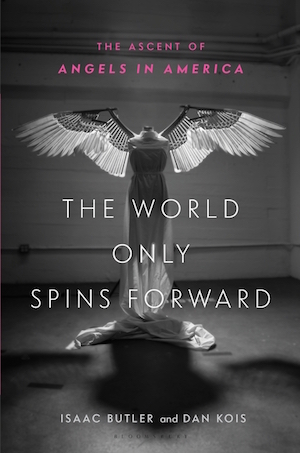
Through vibrant and detailed conversations with actors, directors, producers, crew, and Kushner himself, the storytelling creation unfolds, revealing all of the on and offstage drama, equal to what lies within the text of this great formidable play. Historians and critics debate, digest, and flesh out the dynamics, finding an honorable place for the play within American culture, the AIDS crisis, civil rights triumphs, Reaganism, all the way to our current era, rich in parallels and conflict. The timeline introspection soars, from its surprisingly “gritty” San Francisco premiere to the much-heralded 2018 National Theatre, London, and Broadway rival. The World Only Spins Forward is a thrilling excavation of majestic theatrical history, laid out with meticulous detail and debate, chronicling the herculean efforts required by so many to bring this astonishingly complicated piece of art to the stage. It’s fascinating and complicated, while also unearthing an uplifting heart-wrenching tale of pain, sadness, death, and determined triumph. I found myself overwhelmed with tears without warning when reading this book, and humbled by the revelations of the passionate sophistication by all involved. Each and every character in the play and its creation are given space to be understood in ways that are almost unfathomable when the idea hits first.
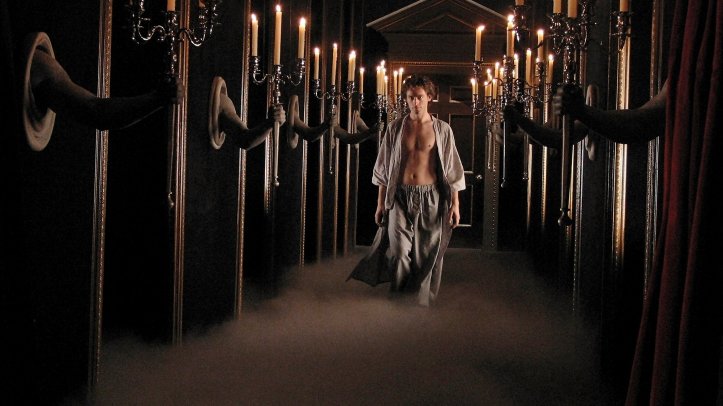
The interlude chapters named after each of the characters is revolutionary in its detailed dissection, with actors filling out the unknown spaces for us to debate and breath in. The honor and time given to the kernel of their truth are embraced with a full-hearted sob of joy, and the pacing and investigatory detail is astoundingly deliberate. To be that determined and that utterly engaged in the political and theatrical history of our world, and to have the grace of these angels to bear witness to the foundations of this theatrical achievement is a gift to us all, especially those who are culturally engaged in theatre, history, and our troubled complicated world that we see crumbling around us. This book is required reading to all of us who want this world to keep spinning forward, for those who demand and desire art and creation to find heightened awareness and light in the darkness of our times. It finds texture and probing depth in its critical deconstruction of the most important play of its era. Find your way into “The World Only Spins Forward.” I don’t know what I was waiting for, or afraid of. Maybe all those tears that I knew I would shed, for all those that I lost to AIDS, and for the love and pain that lives inside the theatre, now and forever, and most definitely in Angels in America.
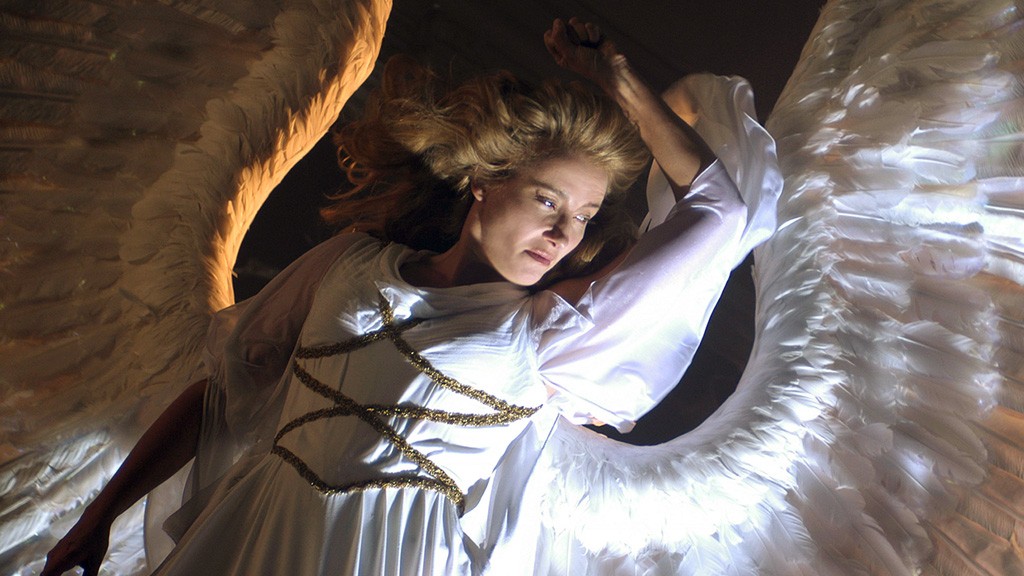
I have had the amazing opportunity to have seen this play both times it has been on Broadway and that one time Off-Broadway. I watched and wrote quite an extensive review of the screening I saw from the National Theatre shown at BAM Cinemas in 2017, (click here to read it) but after reading chapter 3 – ‘Very Steven Spielberg’ – in “The World Only Spins Forward”, I just had to find a way to rewatch the HBO television production that I had seen so many years ago. It consumed in as I read, grabbing hold of all these little details of its creation that I did not know. I wanted to watch it all, spending hours and hours watching video of every production I could get hold of, but I settled on watching the award winning HBO version, especially after reading of how it came into being in this chapter. Little did I know that it was almost a two-part film directed by Robert Altman, and although in concept, the idea is intriguing:
“It’s not only structured like a movie-it’s literally structured like an Altman movie. Quite literally, the form is stolen from “Nashville.”
– Tony Kushner, quoted in “Anxious in America,” New Yorker Talk of the Town, December 26, 1994.
The product, especially after reading of the work that was being done to organize an Altman version, it is probably all for the best that it died the death that it had coming. But after moving and flaying around Hollywood, it landed into the arms of Mike Nichols who was, at the time, making Wit with Emma Thompson for HBO. I loved the moment in the book when Kushner quotes himself when he asked his partner Mark, “Should I let Mike Nichols direct Angels in America? He’s a great filmmaker, but I don’t know.” Mark’s response: “Are you fucking kidding? Call him immediately.” It was an instantaneous Cheshire grin match made in HBO heaven, and it quickly gathered around it true legends and stars, such as Al Pacino, Meryl Streep, and Thompson elevating the screen transition to the highest of heights. An obvious great fit, as it wouldn’t have to worry about opening weekend grosses, Mike Nichols also decided, most beautifully, that, for the other characters, especially the young men, they didn’t want household starry names. They were going to look for actors that had some connection to the world of the stage, a gift to Justin Kirk, who played Prior, Ben Shenkman who played Louis, and Jeffrey Wright, who played Belize in New York, 1993-94, and on HBO. Mary Louise Parker also came out of “audition retirement” nabbing the role of Harper, and perfectly gorgeous Patrick Wilson was cast as the flawed perfectly gorgeous Joe Pitt, which just seems, looking back now, such perfect casting that one can’t imagine it almost any other way.

Rewatching the six-hour, three-part show on Crave.CA (which I specifically signed up for just to watch HBO’s Angels in America over Labor Day Weekend in Northern Ontario, Canada), flooded me once again with all the power and intricacies that are weaved throughout this majestic piece of writing. It takes its time finding the core and the truth of the moments put forth, and never shies away from both its theatricality and its humanity. The production is pitch perfect and gorgeously produced, basically bringing the play somewhat intact to the small screen, with layers and layers of emotional authenticity and humor, while simultaneously bowing its head in awe to the stage legends, like Stephen Spinella, Kathleen Chalfant, and the spectacular) Marcia Gay Harden who helped Broadway-pave the way to this HBO production.
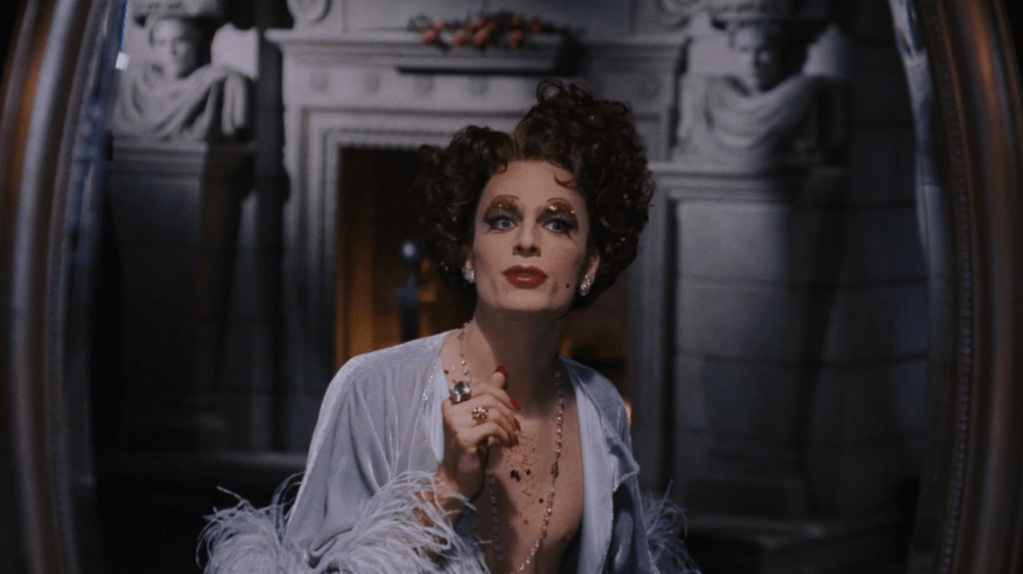
Between the book and the HBO series, I found myself, post show, floating off into the glorious memories of all the times I was fortunate to see this play. When I watched the NTLive’s screening in 2017 at BAM’s Rose Theaters filmed when it was playing at the National Theatre in London, I was excited to know that because of the good grace of my theatre blog, I was going to be able to sit in the glow of this magnificent production once again when it opened at the Neil Simon Theatre on Broadway that following spring, just as it should be seen, live on stage. It was, once again, just the kind of production that moves you beyond anything that you’ve seen before, shattering your senses and tearing your heart to pieces. Directed by the illustrious Marianne Elliott (The Curious Incident of the Dog in the Night-Time, War Horse), her production both in London and on Broadway, forced the past to leave me alone, and not intervene. The book discusses other productions that I wish I could have been privy to, such as the minimalistic 1998 Journeymen production in Chicago, directed by always interesting David Cromer (2ST’s Man from Nebraska), and the Tonellgroep Amsterdam production directed by the magnificent Ivo van Hove (Broadway’s Network, West End’s All About Eve). But it was Elliott’s production at the National Theatre, with Andrew Garfield as Prior, James McArdle as Louis, Denise Gough as Harper, Russell Tovey as Joe, and the amazing Nathan Lane as Roy, that brought down the house for me. I’m sure I said the same when I saw the original Broadway production, but even after reading the book and looking at all the glorious photographs from that production I had a hard time remembering anything from that production in detail, other than that feeling I had when Part One ended with the crashing through of the angel. That’s an image and a feeling that one cannot ever forget. Nor would one want to. The power and excitement was electrifying. Hearing through the interviews in the chapter titled “More Life: Royal National Theatre, London, 2017” about the delicate structuring that was spent to create this piece of art in London, and then for Broadway, it’s no surprise that the triumphant revival was as solidly majestic and complete as one could wish for, and that, I must add, is quite the understatement, if you ask me. Words can barely describe its wonder, even now.
“I’ve never seen a director work as long or as hard on a production. A year of preparation. And you can see that depree-the depth of involvement, it’s reflected in the design and in many of the choices she’s made.”
Kushner, “The World Only Spins Forward” pg 366.
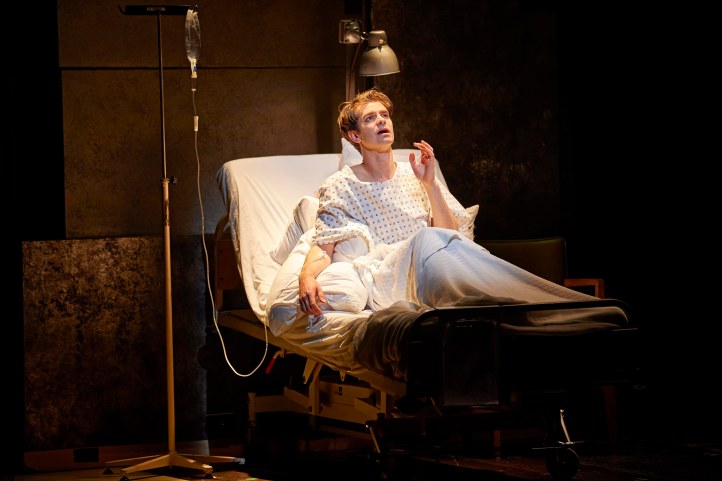
The magnificent Broadway cast – Garfield, Lane, Susan Brown, Gough, Amanda Lawrence, McArdle, and Nathan Stewart-Jarrett, all reprising their roles from the National Theatre’s production, deepened and electrified their performances with every breath they took. The only change from London was in the very tall and handsome form of Lee Pace, taking over the part of Joe Pitt, the closeted Mormon, from the wonderful Russell Tovey (The View from the Bridge). He folded himself into this tight cast most excellently, creating possibly even a stronger, angrier presence for the troubled gay man than before. His performance is on equal footing to the others, making Joseph one of the more tragic souls that walk across the stage. The astoundingly brilliant Kathleen Chalfant (Hannah in workshops, San Francisco, Los Angeles, and New York, 1990-94) said of this most problematic character, “As we all know, at the end, Joe is the only person who isn’t redeemed.” Joe is left to fend for himself, imprisoned in his hyper-aware retraction of self. It was a fascinating read in this cleverly constructive book, informing us that a scene was added to the HBO series that was not in the play. It was a compelling exchange between Hannah and Joe once everything has fallen apart for the young man, that gives him some closure and us some understanding of just how broken he truly is, although redemption is not in the cards for Joe like it is for Louis.
“A lot of the audience says, “Why is Louis welcomed back into the fold five years after, with joe’s mother of all people, and Joe’s nowhere to be found?” A lot of people find that very harsh. But Tony’s idea is that, despite Louis’s cowardice, Louis is redeemable and Joe isn’t. From Tony’s perspective, Louis does not lose his soul; Joe does lose his soul by making peace with what he’s done. The fact that Louis never makes peace with what he’s done is redemption.”
Ben Shenkman (Louis at American Conservatory Theater, San Francisco, 1994-95, and on HBO, 2003) “The World Only Spins Forward” pg 153.

“We won’t die secret deaths anymore. The world only spins forward. We will be citizens. The time has come.”
Rewatching the stunningly directed HBO production after reading the magnificently powerful “The World Only Spins Forward,” those last few lines in this epic piece will always feel as true as it did when I first heard them so many many years ago. The world, at least in this America, feels surprisingly less safe and less progressive as it did even four years ago. It seems to be filled to the brim with a hate that is remarkable in its clarity and frightening in its depth. The book finds power in its ability to look forward and back all at the same time, being honest and hopeful while not sounding ridiculous. I thought this nation was heading somewhere better and more enlightened, but in these dark times, we still just have to believe, I guess, in the bigger picture of civilization. Oskar Eustis (artistic director, Public Theater, New York) states (pg.410), “Angels feels so fresh, twenty-five years after its initial production, because America is still in the life-and-death struggle of figuring out who we are. Will we live in a country that Roy Cohn created, or will we live in the paradise that Belize images at Roy’s deathbed? Will we choose selfishness and fear and greed, or solidarity and inclusion and love? It is either the end of the world or the beginning?” We need to look beyond what we are stuck with now, just like the complex characters had to do back then. We need to keep moving forward, embracing life, even if it is painful and scary.
We can’t stand still. We will #Resist and move forward. With all our might. Dive headfirst into “The World Only Spins Forward” and rewatch the epic HBO production of Angels in America. You won’t regret a minute spent with these creators and with Kushner’s characters.
“Bye now, you are fabulous each and every one and I bless you. More life, the great work begins.”


Great post. Thinking of you and hope all is well.
Sent from Michael’s iPhone
>
LikeLike
Lovely stuff in here. May I offer one tiny editorial tip — the possessive of “it” is “its” not “it’s.” Easy fix. (I didn’t see an option to email you privately or would have done so.)
LikeLike
Thanks for the compliment, and the head’s up. Some of those mistakes slip by, even on second and third readings.
LikeLike
[…] this blog with dedication (besides me thanking you) must also know how much Tony Kushner’s Angels in America means to me. It’s a piece of pure divine gloriousness, stitched with such tender desperation […]
LikeLike
[…] you could hope for, especially with that first monologue performed by Nathan Lane (Broadway’s Angels in America), specifically written for this timely presentation. The connection is clear, and the effort, not […]
LikeLike
[…] opens. And who is playing this sequined stage star, but the legendary Meryl Streep (HBO’s Angels in America), who is everything Dee Dee wishes she was, and more. I must admit I adore or even worship this […]
LikeLike
[…] and time again. It reminds us of tragedy and loss, something akin to reading the heart-breaking “The World Only Spins Forward” about the creation of Tony Kushner’s epic masterpiece Angels in America. But, here in this […]
LikeLike
[…] as Dee Dee Ramone, Hunt as drummer Marky Ramone, and the always engaging Justin Kirk (HBO’s “Angels in America”) as the controlling Johnny Ramone, find the right flavor and level of engagement, especially when […]
LikeLike
[…] role. Directed by the legendary George C. Wolfe, the musical, with book and lyrics by Tony Kushner (Angels in America) and music by Jeanine Tesori (Fun Home), had a short run, but was extremely well received, […]
LikeLike
[…] himself with people who are both strongly theatrical and super-intelligent, like Tony Kushner (Angels in American; Caroline, or Change) who wrote the adaptation of the film, and the Tony Award-winning […]
LikeLike
[…] by a familiar presence, President Orlean, played deviously well by Meryl Streep (HBO’s “Angels In America“; “The Prom“). She seems to be distracted, or ominously, more concerned with her […]
LikeLike
[…] played to perfection by Mary-Louise Parker (Broadway’s The Sound Inside; HBO’s “Angels in America“). They both did honor to the same parts 25 years ago, and here, on Broadway, they find […]
LikeLike
[…] was Mary-Louise Parker (Broadway’s The Sound Inside; HBO’s “Angels in America“) who took over that Broadway stage with an emotionally captivating remounting of Paula Vogel’s […]
LikeLike
[…] panorama, I experienced the same sort of sharp emotional jabs as when, for the first time, I saw Angels in America, and The Inheritance, two epic explorations of queerness, and HIV/AIDS in America that instantly […]
LikeLike
[…] Hooves Belonged to the Deer, which delivered the same sort of sharp emotional jabs as when I saw Angels in America, and The Inheritance for the first time. Those two were epic explorations of queerness and […]
LikeLike
[…] Hooves Belonged to the Deer, which delivered the same sort of sharp emotional jabs as when I saw Angels in America, and The Inheritance for the first time. Those two were epic explorations of queerness and […]
LikeLike